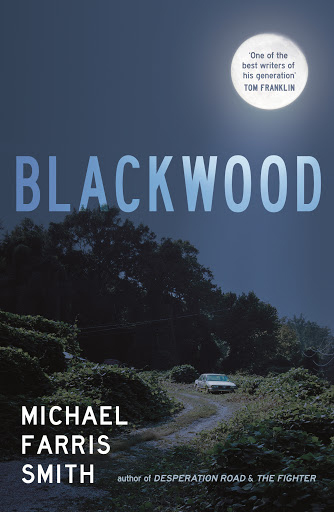Michael Farris Smith, Blackwood (2020)
Review by Lee Horsley

Blackwood, Michael Farris Smith’s fifth novel, is Southern gothic noir at its most bleak and haunting. Beautifully written, moving and darkly disturbing, it takes us to a strange and frightening valley that is covered by impenetrable vines. All around the impoverished town of Red Bluff, Mississippi, the land is being swallowed by kudzu vines, its outskirts inexorably becoming part of this treacherous, malevolent world. Along with decaying houses and other human relics, the vines seem to have wound themselves around the pain of past lives, bringing madness and despair to anyone who ventures too far inside:
“The rich green depths and rises and falls of trees and hillsides long since conquered by the timeless vines. The man gazed across the great expanse of green, captivated by the reach of the kudzu… The vines hanging down from clumps of forest that served like some curtain into the backstage world below the kudzu and into it the man entered… The kudzu canopy above blocking out the moonglow and in the dark he heard things and imagined more things and he hurried back out to the road. His breaths quicker.”

Smith says in interview (Los Angeles Review of Books) that his initial idea for Blackwood was that of a man staring across the valley and “beginning to feel like there was something from below whispering to him, beginning to feel like the vines may actually be coming for him, and how his being alone near this valley could wreak havoc on his imagination and spirit.” There is a darkness that consumes the characters drawn into this fallen world. They seem to meet within it their own past sins and torments.
We first meet Smith’s broken, nameless drifter when he arrives in town with a woman and child. Their “foulrunning Cadillac” will go no further and they leave it at the edge of the kudzu-covered valley. All three of them are eventually drawn into the netherworld where the man “hears whispers in the vines that drive him insane.” He is a man who is tormented by the secrets of his past, most recently by his abandonment of his younger son, who has been left behind in another town. As he spirals downward in his obsessive journeys into the darkness and lurking evil of the valley, redemption seems less and less possible.
The townsfolk, too, struggle under the burden of past sins and regrets. Colburn, a junkyard sculptor who has returned to Red Bluff after twenty years, is still haunted by the trauma of his father’s suicide. The well-intentioned, long-serving Sheriff Myer found the body when Colburn’s father hung himself and now wonders whether the badness will ever leak out of the house where it happened. But there are new sources of badness. When twin boys vanish, Colburn is the last to see them before they are swallowed by the tangled vines of the valley. Celia, a woman loved by Colburn, also disappears. The aging Myer has the task of organising search parties to find both Celia and the twins – “no one knowing anything and as the days went by without answers. The suggestions of a greater evil lurking about in the depths of the valley.”
Blackwood is an extraordinary novel, the kind that lingers in your mind long after you have finished reading it. Crimeculture also wants to recommend both The Fighter (2018) and Desperation Road (2017). Smith says in his LARB interview that the younger son abandoned by the drifters before the beginning of Blackwood is the boy who, when he grows to manhood, becomes the protagonist of The Fighter. It’s a fascinating character link. Above all, though, Smith’s novels are linked by his compassionate vision, his distinctive voice and the poetic power of his style.
